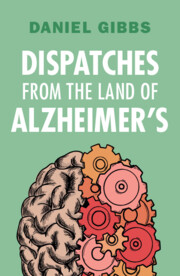Book contents
- Dispatches from the Land of Alzheimer’s
- Reviews
- Dispatches from the Land of Alzheimer’s
- Copyright page
- Dedication
- Lost in Thought
- Contents
- Acknowledgments
- Prologue
- 1 Physician Heal Thyself
- 2 Evaluating New Advances in Alzheimer’s Research
- 3 Alzheimer’s Dementia or Alzheimer’s Disease
- 4 The First Patient with Alzheimer’s Disease
- 5 Kidnapped in Kinshasa
- 6 Smell, Disgust, and Alzheimer’s
- 7 Apolipoprotein-4 (APOE-4)
- 8 Lost in the Fog of Alzheimer’s
- 9 My Father’s “Stuff”
- 10 Face Blindness during a Pandemic
- 11 Biomarkers for Alzheimer’s Disease
- 12 Olfactory Impairment in Covid-19 and Alzheimer’s
- 13 Alzheimer’s Disease and Work
- 14 Crossword Controversies
- 15 Can Loneliness Increase Risk for Dementia?
- 16 Excessive Laxative Use and Dementia
- 17 Dog Dementia (Canine Cognitive Dysfunction)
- 18 The Possible Role of Brain Inflammation in Alzheimer’s Disease May Be More Significant in APOE-4 Carriers
- 19 Surprisingly Good News about the Acetylcholinesterase Inhibitors (Donepezil, Rivastigmine, and Galantamine)
- 20 More about the Importance of Exercise
- 21 Rolling on the River
- 22 The MIND Diet Revisited
- 23 My Photographs, Then and Now
- 24 Does Cataract Surgery Really Decrease the Risk of Dementia?
- 25 Hearing Loss, Aphasia, and Dementia
- 26 To Sleep, Perchance to Dream
- 27 The Amyloid Hypothesis Is Not Dead, but It May Be Gasping for Breath
- 28 Could Lecanemab Offer a Ray of Hope?
- 29 A Fatal Case of Multiple Brain Hemorrhages Associated with Lecanemab
- 30 Cerebral Amyloid Angiopathy (CAA)
- 31 Hitting the Sweet Spot in the Spectrum of Alzheimer’s Disease for Future Trials of Anti-Amyloid Medications
- 32 Disappointing Results of Two Human Trials of Monoclonal Antibodies in Parkinson’s Disease
- 33 Repurposing Old Drugs for Alzheimer’s Treatment
- 34 Writing While Impaired
- 35 Spreading the Word
- 36 Saying Goodbye to Lizzie G
- 37 Amyloid and Tau PET Scans of My Brain
- 38 Running on a Field of Dreams
- 39 Living in the Moment with Alzheimer’s
- Index
- Plate Section (PDF Only)
- References
17 - Dog Dementia (Canine Cognitive Dysfunction)
Published online by Cambridge University Press: 19 January 2024
- Dispatches from the Land of Alzheimer’s
- Reviews
- Dispatches from the Land of Alzheimer’s
- Copyright page
- Dedication
- Lost in Thought
- Contents
- Acknowledgments
- Prologue
- 1 Physician Heal Thyself
- 2 Evaluating New Advances in Alzheimer’s Research
- 3 Alzheimer’s Dementia or Alzheimer’s Disease
- 4 The First Patient with Alzheimer’s Disease
- 5 Kidnapped in Kinshasa
- 6 Smell, Disgust, and Alzheimer’s
- 7 Apolipoprotein-4 (APOE-4)
- 8 Lost in the Fog of Alzheimer’s
- 9 My Father’s “Stuff”
- 10 Face Blindness during a Pandemic
- 11 Biomarkers for Alzheimer’s Disease
- 12 Olfactory Impairment in Covid-19 and Alzheimer’s
- 13 Alzheimer’s Disease and Work
- 14 Crossword Controversies
- 15 Can Loneliness Increase Risk for Dementia?
- 16 Excessive Laxative Use and Dementia
- 17 Dog Dementia (Canine Cognitive Dysfunction)
- 18 The Possible Role of Brain Inflammation in Alzheimer’s Disease May Be More Significant in APOE-4 Carriers
- 19 Surprisingly Good News about the Acetylcholinesterase Inhibitors (Donepezil, Rivastigmine, and Galantamine)
- 20 More about the Importance of Exercise
- 21 Rolling on the River
- 22 The MIND Diet Revisited
- 23 My Photographs, Then and Now
- 24 Does Cataract Surgery Really Decrease the Risk of Dementia?
- 25 Hearing Loss, Aphasia, and Dementia
- 26 To Sleep, Perchance to Dream
- 27 The Amyloid Hypothesis Is Not Dead, but It May Be Gasping for Breath
- 28 Could Lecanemab Offer a Ray of Hope?
- 29 A Fatal Case of Multiple Brain Hemorrhages Associated with Lecanemab
- 30 Cerebral Amyloid Angiopathy (CAA)
- 31 Hitting the Sweet Spot in the Spectrum of Alzheimer’s Disease for Future Trials of Anti-Amyloid Medications
- 32 Disappointing Results of Two Human Trials of Monoclonal Antibodies in Parkinson’s Disease
- 33 Repurposing Old Drugs for Alzheimer’s Treatment
- 34 Writing While Impaired
- 35 Spreading the Word
- 36 Saying Goodbye to Lizzie G
- 37 Amyloid and Tau PET Scans of My Brain
- 38 Running on a Field of Dreams
- 39 Living in the Moment with Alzheimer’s
- Index
- Plate Section (PDF Only)
- References
Summary
Jack, our English cocker spaniel, is eight years old, middle-aged for a dog. He may be a little neurotic, after all he is a spaniel, but he is still sharp as a tack and has no signs yet of cognitive impairment. It turns out that many mammals do develop cognitive impairment toward the end of their lives. In dogs, this cognitive decline is called canine cognitive dysfunction (CCD), and it occurs in up to 60% of dogs over 11 years of age. It is more common in small dogs probably because they tend to live longer than large dogs. As we shall see, it has similarities, and some differences, compared to Alzheimer’s disease in humans.
- Type
- Chapter
- Information
- Dispatches from the Land of Alzheimer's , pp. 70 - 73Publisher: Cambridge University PressPrint publication year: 2024

